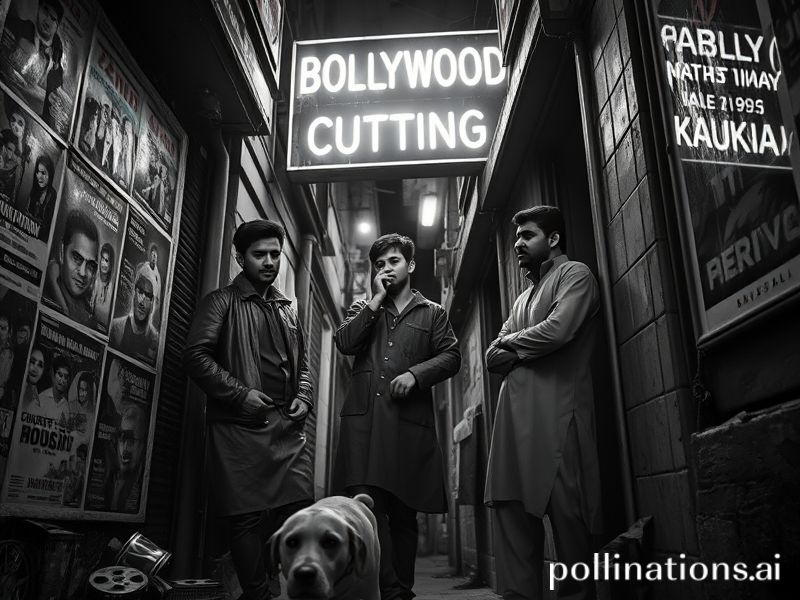Global Heirwaves: How Bollywood’s Nepotism Became the World’s Guilty Streaming Pleasure
The Bastards of Bollywood: When Nepotism Goes Global and Gains a Passport
By Our Man in the Projection Booth, somewhere over the Indian Ocean
MUMBAI—Picture, if you will, the Cannes red carpet: a perfumed catwalk where a starlet’s borrowed diamonds weigh more than the GDP of Tuvalu. Now pan east by 7,000 kilometres, zoom in on a humid Bandra bungalow, and meet the newest export from the subcontinent: the fully franchised, venture-funded, algorithm-approved Bastard of Bollywood. He’s not so much born as beta-tested, launched with the same soft-focus inevitability as a new iPhone. And like any good smartphone, he comes pre-loaded with bugs you’ll be told are features.
Nepotism, of course, is hardly unique to Mumbai; Hollywood keeps its own crown princes on retainer, Europe has its von-something dynasties, and even Korean pop has started auto-filling group line-ups with the surnames of yesterday’s tycoons. What distinguishes the Bollywood strain is the sheer industrial scale and the exquisite PR choreography that turns blatant inheritance into a TED Talk on meritocracy. One minute Junior is trending on Twitter for mispronouncing “epitome”; the next, a blue-ticked think-piece congratulates him for “disrupting privilege” by monetising it. Somewhere, a management consultant in Zurich files the case study under “scalable nepotism.”
The global implications are deliciously cynical. Streaming giants—those self-proclaimed democratisers of culture—have realised that nothing travels quite like dynasty. They slap subtitles on the same six surnames and beam them from São Paulo to Saskatoon. The result is a planetary monoculture where your cousin in Lagos can quote dialogue from a film whose star has never stood in a visa queue. Call it soft power by way of surname recognition; call it the McKinsey-fication of melodrama. Just don’t call it new.
Meanwhile, the Indian state—never one to miss a branding exercise—has begun issuing “Overseas Citizen of Bollywood” certificates, a sort of O-1 visa dipped in turmeric. Holders can bypass immigration lanes, customs duty, and, if the tabloids are accurate, several laws of physics. The program is marketed as cultural diplomacy. Critics call it money laundering for charisma. Both sides are correct, which is the hallmark of any truly modern nation.
The collateral damage is less photogenic. Somewhere in the queue outside Yash Raj Studios, a thousand wait-listed actors rehearse their tragic backstories for the next reality show. Their parents mortgaged fields to buy them gym memberships; their accents are coached out by voice artists who themselves once dreamed of stardom. They are the extras in someone else’s coming-of-age montage, and they know it. Watch them applaud politely when the Bastard’s convoy glides past, tinted windows reflecting their own expendability. If you squint, it looks like democracy in action.
International financiers call this “human-capital arbitrage.” The rest of us call it Tuesday.
There is, naturally, a sustainability angle—because even exploitation needs a green label these days. PR firms now brag about “carbon-neutral nepotism,” noting that the star kid’s private jet runs on biofuel derived from the crushed dreams of indie filmmakers. The UN is reportedly drafting guidelines: Sustainable Development Goal 17.3—Ensure inclusive and equitable nepotism for all. Ban Ki-moon did not return our calls, but then again he never got a cameo in a Karan Johar picture.
And yet, for all the eye-rolling, the Bastards keep winning. Their films open to $20-million weekends in China, where subtitles struggle to translate “yaar” but succeed splendidly with “daddy issues.” American late-night hosts, hungry for diversity quotas, book them to dance between punch lines about Trump. European film schools screen their work as cautionary case studies, then immediately call their agents for internships. The circle of life, Simba, now comes with cross-platform merchandising.
We could end on a note of moral outrage, but that would be disingenuous. The audience—global, exhausted, doom-scrolling—likes its myths pre-chewed. Give us a hero whose surname we can pronounce; give us a villain who looks like our own inadequacies in 4K. The Bastards of Bollywood oblige, and in doing so they hold up a funhouse mirror to a planet that outsourced aspiration to the highest bidder.
So here’s to the next generation: may your jawlines stay chiselled, your accents stay imported, and your privilege stay profitable. The world is watching—mostly on phones manufactured by someone else’s cousin—and we’ve all paid for front-row seats. Curtain up, cue the item number, and please ensure your hypocrisy is switched to airplane mode. We’re going global.







